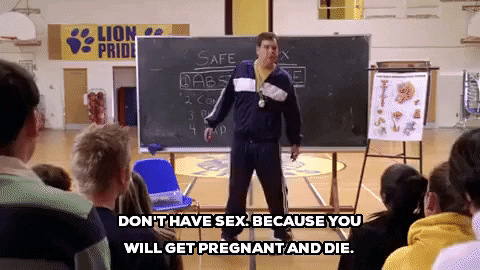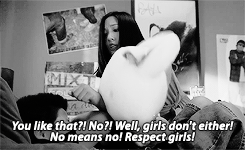I think we can all agree that sex education is of rather high importance in this day and age, especially since porn is literally available to anyone on the internet. The younger kids now have much more access to sexual content than we were at their age.
In Singapore, the highest incidence of STIs is among the 20 to 30-year-olds (based on 2016 data). Not that surprising considering that’s when most people peak sexually, but at the same time it makes you wonder why they don’t know enough to protect themselves and not get STIs. That aside, the most alarming stat is for those under 20 – cases have doubled in the last decade, and teens are just not that great users of contraception (maybe because it’s a pubescent need to sex now kind of thing). You would think that this is the worst part of not being educated about sex, but there’s worse!!! With the recent NUS saga, we think it’s pretty evident that people out there still don’t understand the severity of sexual harassment and consent.
My last sex ed experience in secondary school (it stops there if you go to poly because they expect you to instant level up) involved 1. horrifying pictures of fucked up genitalia from STIs 2. how to insert a tampon into your vagina 3. how to condom 4. DON’T DO THE SEX. What we have here falls under the Abstinence-Plus kind of sex ed programme, which is basically useless.

I’m not even going to talk about sex ed from parents because that shit ain’t happening with Asian parents, maybe the next generation will be a bit better with this. Some people think that talking about sex with your children would make them want to have sex earlier, but it’s a no. In fact teens whose parents talked to them about sex (like proper conversations about sex, not “you were picked up from the dustbin” kind of origin stories) before adolescence had less anxiety over these topics, which helped with later sexual debuts and lowered risky sexual behaviour.

1. Contraception
While most of our sex ed programmes cover condoms and the other types of contraceptives, the approach is always to list down the options and less on how they actually work (with the exception of the condom on banana video). With STIs, we need to be clearer with how they are spread (oral, penetration, anal, etc.) so people know what kind of contraception works best for them. Also, we need to destigmatise the whole getting tested for STIs thing – if you want to have sex, you should know how to have safe sex and practice good sexual habits. The reason why there’s even an increase in STIs is probably because the people who have it aren’t getting tested (and treated for it) and spreading it to more people.
I’ve provided some links to sex education resources at the bottom of this post so y’all can GET EDUCATED.
Most of the sex ed programmes in schools are catered to students under the age of 16, so students should also know the law to stay out of trouble. The law in this case refers to the fact that the legal age to have sex in Singapore is 16 years old.

2. Sexual Harassment, Abuse, and Consent
I think this is one of the most important parts of sex education that we haven’t been taught in school. With sexual harassment, there are still people who blame the victims instead of the perpetrators, and it happens incredibly often in our patriarchal society. It’s becoming increasingly evident that people really do need to be taught the definition and importance of consent, seeing as to how supposedly “educated” local uni kids can still commit sexual atrocities. Never mind that we are in a state of moral panic, we need to educate the people on what constitutes sexual harassment and abuse, the consequences of negative sexual behaviours, as well as what it does to people on the receiving end of it.
Most often perpetrators tell their victims that nobody will believe them and do the gaslighting thing. I don’t think there’s any way to “protect yourself from being a victim” because a lot of the onus lies on people not being fucked up assholes, and one way to alleviate that kind of behaviour is to educate and instil the rights and wrongs from young. If our education (and even political) system can so effectively instil the CHEATING IS BAD attitude in us, I’m pretty sure they can do better with instilling some DOING ANYTHING SEXUAL WITHOUT CONSENT IS BAD attitudes. In addition to that, people need to know that there are organisations out there that can help with sexual abuse & harassment and that they are not alone. But of course if the polis can kindly be a bit more effective with the punishment part that would be great.
In fact, the prevalence of such mentalities on victim-shaming and rape culture is evident in seemingly harmless comments. Going back to the most recent case study of what happened in NUS/NTU, BOTH OF WHICH ARE EDUCATIONAL INSTITUTIONS, there were certain comments made by members of the public along the lines of “next time I just rape her then apologise la”. People need to educate themselves on how to respond to sexual harassment/assault as an issue, as well as how to support people who have been victims of sexual assault.

This is going to be an entire other post but what is important here is that people have to understand what consent means. The very fundamental understanding is that “no” means “no”. There are other ways that consent can be given (or not), for example, when someone is in a situation that s/he feels threatened/unsafe/in danger, the person may end up saying “ok” or “yes”, even though s/he does not feel comfortable with whatever that might happen after. Is that consent? If someone is in physical danger, why wouldn’t s/he give “consent” to ensure that s/he does not get beaten up/raped/killed?
Consent is important between and among individuals. It doesn’t matter if you are married or dating or complete strangers. Always seek consent before engaging in any sexual activity. More information here.

3. Sexual Health & Wellness – Masturbation & Orgasms
One of the least popular things for educators / parents to talk about during sex ed is the topic of masturbation and how it’s not actually a bad thing (unless you’re mormon I guess). Of course we don’t expect schools to teach students how to flick the beans or beat the meats, but validating what these teens want to do with their pubescent bodies should be part of sex education (so if they try it later on, they won’t feel shame or anxiety towards something that’s perfectly normal).
Knowing what orgasms are (esp for women) is important, and it helps us get to the having better sexual experiences phase faster. I would say that knowing what orgasms are and getting better associated with the anatomy involved would definitely help people have better orgasms and better sex. We often see orgasms as a purely sexual thing, but they’re actually good for both our sexual and mental health! It can help alleviate pain, help you get better sleep (esp for men), and the dopamine + oxytocin released is stress-relieving, which also makes you happier (or at least temporarily forget about how your existence has no meaning).

4. Sexuality
Many people think that educating kids on the LGBTQ+ spectrum will make them turn gay or become a flaming bisexual, but your children don’t become smarter just because you tell them to study right???? Most non-straight/cis people struggle with their identity in the beginning because none of these were taught in school – you don’t learn in sex ed that you can be attracted to people of the same sex/gender, you don’t learn how to have safe gay sex, you don’t learn about how gender and sex are different things. Maybe kids these days are a bit more educated with social media and the internet, but these are important pieces of information that people need to know about. A lot of queer people don’t have the support they need because we still live in a society where people can’t get over repealing 377A even though it’s not enforced. This isn’t just just for the sake of those who are LGBTQ+, but also for everyone else to understand the concept of sexuality and gender so that they can be more empathetic and more accepting of their friends who fall under that category. We have social studies and 好公民 (Good Citizen) for us to live in racial harmony, so maybe it’s time for the next step?

5. Communication & THE EMOTIONS
This is something that is quite often ignored or completely left out because of all the abstinence talk, but hey communication is important when it comes to sex (especially with consent). Communicating with your partner on the topic of sex is about as important as the sex itself, and it’s something that should be talked about more often because it definitely helps with the quality (and quantity) of sex. You may think that sex and any form of emotion can be easily separated but it turns out both love and sex activate the same part of the brain (in both men and women!). For teenagers with raging hormones, the feelings are even more prevalent and they should be taught how to manage the emotional components of sex. There are also certain areas that people have difficulty communicating with their partners – personal preferences, frequency of sexual activity, for a start.
_______________
So obviously there is a lot to cover even within each key point, which is why we will go into further detail in our future posts. In essence, what we want to do is to cover intentionality, decision-making, and responsibility through sex education in the 21st century. It’s about time that people educated themselves about sex!!
_______________
SOME RESOURCES FOR Y’ALL TO EDUCATE YOURSELVES IN LIGHT OF OUR EDUCATION SYSTEM’S FAILURE TO EDUCATE US ABOUT SEX:
